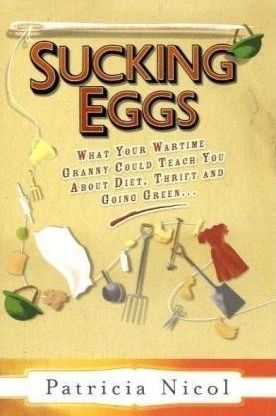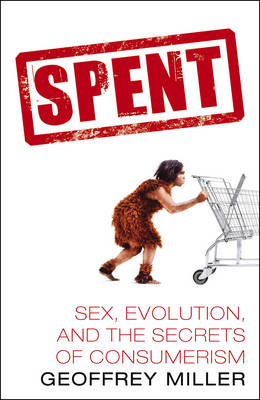Sucking Eggs
by Patricia Nicol&
Spent
by Geoffrey MillerShopping: one of life’s simple pleasures. Or is it? Here at Boom, we like to provide material for the enquiring reader to mull over. This time, we’ve selected two books that seek to get to the bottom of the whys and wherefores of shopping and consumerism – and not just related to the consumption of food for thought.

In her book Sucking Eggs, Nicol (whose writing you may be familiar with in her capacity as a journalist for the Sunday Times newspaper) provides a very readable account of the limits and possibilities for shopping that the average British citizen enjoyed during the Second World War as a result of rationing. She expertly makes parallels with our current economic and environmental climate, arguing for us to learn from the past and embrace again a culture of voluntary thrift and austerity. Readers are treated to tales of terrifying night-time journeys without street- or car headlights, leading to the introduction of cats-eyes in roads; to extraordinary recipes that sought to magic up tasty meals for hardworking families out of very few ingredients – scrambled powdered egg, anyone? - which somehow also yielded delicious contemporaries like the humble jacket spud; and the volunteering of thousands of humble kitchen objects to provide materials to build fighter planes (not just pie-tin in the sky…), which set the precedent for modern-day recycling.
Sucking Eggs is most certainly not what some might consider a typically dull history book. Instead it is written in such a way that it paints vivid pictures of consumption in 1940s and 50s Britain, and the ways that the ordinary citizen attempted to serve their country through their shopping. At the end of each chapter – spanning food, fashion, waste, and energy – Nicol presents a series of learning points, to help us get to grips with the lost arts of making do with less that only a couple of generations ago were second nature. Even so, the book is less a preachy ‘how to’ manual and more an enjoyable snapshot of wartime Britain, richly illustrated with the excellent government produced propagandist imagery of the time.

An entirely different approach to shopping is encapsulated in Miller’s book Spent. Miller, an academic evolutionary psychologist and author of related generalist books, The Mating Mind: How Sexual Choice Shaped the Evolution of Human Nature and Mating Intelligence: Sex, Relationships, and the Mind’s Reproductive System, has produced a further foray into the mind (and body) of the consumer in Spent. Here, he takes quite a different and yet similarly historically grounded look at shopping and consumerism to Nicol's Sucking Eggs. He extends the theory of evolution to our consumption practices, to argue that we have evolved over millennia to display certain traits to make us more attractive to others, which have lately culminated in the purchase and display of particular commodities. Wonder no more at why you find the latest iPod so incredibly beguiling, even though you are never likely to fill it with music or use it as a spirit level (yes, this is a real feature, and no, we have no idea why anyone thought this was a good idea).
His central argument is that our quest to accumulate things and use these things to display our status to our fellow human beings is a manifestation of an ingrained desire to display six traits: general intelligence; openness; conscientiousness; agreeableness; stability; and extraversion. Miller makes the salient observation that people use all manner of things to display these traits, introducing interesting examples of car bumper stickers by North Americans to illustrate his point - where, for example, the sticker ‘Can’t sleep, clowns will eat me’ indicates low stability, ‘Who would Jesus bomb?’ indicates high agreeableness, and ‘Get off the phone and crash already’ indicates high conscientiousness – which rather puts the typical British ‘baby on board’ sticker to shame. It’s not just bumper stickers, of course: Miller matches purchases of car brands to what he refers to as the ‘central six’ traits, along with very many more examples to provide an entertaining and occasionally laugh-out-loud funny analysis of our shopping preferences. Like Nicol, Miller sets out proposals for alternative ways we can consume, in the context of our contemporary environmental problems (because, of course, our shopping habits are directly linked to our use of resources and generation of pollution, not least our contribution to climate change), that better display the central six traits.
Boom recommends discerning readers take the first step on a long yet rewarding journey to release yourselves from unthinking consumerism, by picking up one or both of these excellent books. Written for the lay reader yet with sufficient content to engross even those with specialist interests, each of these tomes will at the very least provide you with some fascinating snippets for dinner party conversation.
Four booms apiece, we reckon.
